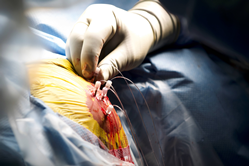
“We are committed in adopting technology that is at the forefront of surgical treatments for epilepsy. The use of the robot will help the Memorial Neuroscience Institute to provide the cutting edge care to our patients.”
HOLLYWOOD, Fla. (PRWEB)
February 26, 2020
The epilepsy team at Memorial Neuroscience Institute successfully completed its first use of a minimally-invasive, robotic device that helps pinpoint the origin of epileptic seizures on a patient.
The device, now in full use at Memorial Regional Hospital, is called a Robotized Surgical Assistant, or ROSA. With assistance from the robot, neurosurgeons only need to make small, precise incisions in the scalp and skull to place electrodes deep in the brain and investigate where seizures are triggered.
The robot also improves accuracy, safety and can significantly reduce total surgery time, said Tarek Zakaria, MD, Medical Director for the Adult Neurology Program and Epilepsy Program.
By using the new technology, more data will be available to the epilepsy team to offer patients more advanced treatment options and help them to achieve their dreams to be seizure free, Zakaria said.
“We are committed in adopting technology that is at the forefront of surgical treatments for epilepsy,” Zakaria said. “The use of the robot will help the Memorial Neuroscience Institute to provide the cutting edge care to our patients.”
When medication is not enough to control seizures, neurosurgeons like Christopher DeMassi, MD and Daxa Patel, MD may take a surgical approach. That includes altering or removing brain tissue at the location where a patient’s seizures begin. However, they can only do so if they can first zero in exactly where that origin is. This is where Rosa can assist.
Recently, they performed the two-part procedure on a 24-year-old female patient, who began having epileptic seizures at age eight and had exhausted all available medications.
The procedure, called robot-assisted stereoelectroencephalography (SEEG), was performed as part of the services offered by the Memorial Neuroscience Institute Comprehensive Epilepsy Center.
“Our goal is to always bring in the latest innovative technologies to achieve the best possible outcome for our patients,” DeMassi said. “This is just the latest advancement available to the South Florida community and keeps us at the front of epilepsy care.”
Surgeons used ROSA and a 3-D reconstruction of the patient’s brain to guide them where to surgically implant electrodes without having to remove sections of her skull. DeMassi and Patel then used the robot’s arm to make two- or three-millimeter holes in the scalp through which the electrode wires were passed.
With the electrodes in place, Zakaria and his team were later able to see part of the patient’s brain “light up” on a computer monitor as a seizure began, essentially flagging the point of origin.
“Memorial Neuroscience Institute is proud to offer the most technologically advanced and comprehensive services for our patients and the community,” said Haroula Protopapadakis Nordem, FACHE, Associate Administrator at Memorial Regional Hospital.
“The addition of the ROSA to our program will allow our surgeons to deliver more precise results in a less invasive manner and allow our physicians to treat patients who otherwise might not have had a feasible treatment option,” she said.
Memorial’s epilepsy center is accredited by the National Association of Epilepsy Centers (NAEC) as a Level 4 program, a designation for programs offering the highest level of comprehensive and specialized care.
Memorial Regional Hospital in Hollywood, Fla., is one of the largest hospitals in Florida and is a facility of Memorial Healthcare System, one of the largest healthcare systems in Florida. Its wide scope of medical services and programs includes Memorial Cancer Institute, Breast Cancer Center, Cardiac and Vascular Institute, Neuroscience Center, Comprehensive Weight-Loss Surgery Program, Family Birthplace, Center for Behavioral Health, Sickle Cell Day Hospital, Women’s Services, Fitness and Rehabilitation Center, and a level I Trauma Center. For more information, visit memorialregional.com.
Share article on social media or email:

